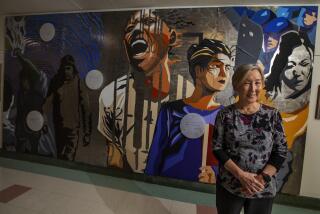UC Irvine professors create a video game that explores the culture of 18th-century Ghana
Magda El Zarki recalls repeatedly telling her children to stop playing video games and enjoy the outdoors.
She laughs at the memory now.
A visit to Ghana in 2010 inspired the UC Irvine computer science professor to try her hand at creating virtual reality spaces and later computer games.
She and Patricia Seed, a UC Irvine history professor, and Jessica Kernan, an industry professional and a staff member at the college’s Institute for Virtual Environments and Computer Games, developed the computer game “Sankofa.”
Set in 18th-century Ghana, then known as Asante, the storyline begins when a mother sends her daughter to gather yams from the market. The mother cautions her daughter about Ananse, a trickster spider.
Gamers experience the West African country through folktales, cultural practices and daily activities of the Asante people.
The goal was to create a game suitable for instructors who want to teach African history, said El Zarki, who also is director of the Institute for Virtual Environments and Computer Games.
For now, it’s about an hourlong game, she said, though there’s hope that with additional funding it could be lengthened to 90 minutes with built-in lesson plans.
More than $200,000 was spent to complete what is available now, she said.
El Zarki previously collaborated with Seed to create a virtual reality piece on 15th-century Ghanian slave forts that El Zarki viewed on a visit to the country. The finished product, “Elmina,” enables users to virtually explore the forts.
“I thought this is so important for African American history, it’d be a nice gesture to do that if kids are learning about the slave trade,” she said.
But feedback from students proved otherwise, some calling it depressing and instead suggesting a game showing West African arts and culture.
El Zarki understands the hesitance in accepting games as educational tools.
Her viewpoint shifted after realizing her children knew more about Greece when they visited in 2007 than she had expected because they had played the “Age of Mythology” video game.
“I realized I guess there is something to games,” she said. “I realized games would be the future.”
priscella.vega@latimes.com
Vega writes for Times Community News.
More to Read
Start your day right
Sign up for Essential California for news, features and recommendations from the L.A. Times and beyond in your inbox six days a week.
You may occasionally receive promotional content from the Los Angeles Times.







